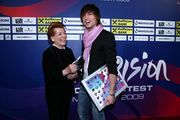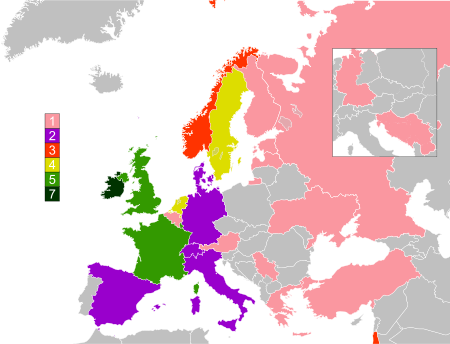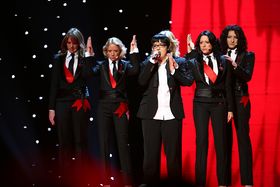List of Eurovision Song Contest winners

Fifty-eight songs have won the Eurovision Song Contest, an annual competition organised by member countries of the European Broadcasting Union. The Contest, which has been broadcast every year since its debut in 1956, is one of the longest-running television programmes in the world. The Contest's winner has been determined using numerous voting techniques throughout its history; centre to these have been the awarding of points to countries by juries or televoters. The country awarded the most points is declared the winner.[1] The first Eurovision Song Contest was not won on points, but by votes (two per country), and only the winner was announced.[2]
There have been 54 Contests, with one winner each year except the tied 1969 Contest, which had four. Twenty-five different countries have won the contest. Switzerland won the Contest on their debut—the first Contest, in 1956. The country with the highest number of wins is Ireland, with seven. Portugal is the country with the longest history in the Contest without a win; it made its forty-fourth appearance at the 2010 Contest. The only person to have won more than once as performer is Ireland's Johnny Logan, who performed "What's Another Year" in 1980 and "Hold Me Now" in 1987. Logan is also one of only five songwriters to have written more than one winning entry ("Hold Me Now" 1987 and "Why Me?" 1992, performed by Linda Martin).[3] This unique distinction makes Logan the only person to have three Eurovision victories to his/her credit, as either singer, songwriter or both.
Winning the Eurovision Song Contest provides a unique opportunity for the winning artist(s) to capitalise on their success and surrounding publicity by launching or furthering their international career. However, throughout the history of the Contest relatively few names have gone on to be huge international stars. The most notable winning Eurovision artists whose career was directly launched into the spotlight following their win were ABBA, who won the Contest for Sweden in 1974 with their song "Waterloo". ABBA went on to be one of the most successful bands of their time.[4] Another notable winner who subsequently achieved international fame and success was Céline Dion, who won the Contest for Switzerland in 1988 with the song "Ne partez pas sans moi", though her international singing career came some years later and is not generally directly associated to her winning the contest.[5]
Contents |
Winners
| Year | Country | Song | Performer | Writers | Points | Margin | Second place | Date | Host city |
|---|---|---|---|---|---|---|---|---|---|
| 1956 | "Refrain" | Lys Assia | Géo Voumard, Émile Gardaz | N/A[N 1] | N/A | N/A | 24 May 1956 | Lugano | |
| 1957 | "Net als toen" | Corry Brokken | Guus Jansen, Willy van Hemert | 31 | 14 | 3 March 1957 | Frankfurt am Main | ||
| 1958 | "Dors, mon amour" | André Claveau | Pierre Delanoë, Hubert Giraud | 27 | 3 | 12 March 1958 | Hilversum | ||
| 1959 | "Een beetje" | Teddy Scholten | Dick Schallies, Willy van Hemert | 21 | 5 | 11 March 1959 | Cannes | ||
| 1960 | "Tom Pillibi" | Jacqueline Boyer | André Popp, Pierre Cour | 32 | 7 | 29 March 1960 | London | ||
| 1961 | "Nous les amoureux" | Jean-Claude Pascal | Jacques Datin, Maurice Vidalin | 31 | 6 | 18 March 1961 | Cannes | ||
| 1962 | "Un premier amour" | Isabelle Aubret | Claude-Henri Vic, Roland Stephane Valade | 26 | 13 | 18 March 1962 | Luxembourg | ||
| 1963 | "Dansevise" | Grethe and Jørgen Ingmann | Otto Francker, Sejr Volmer-Sørensen | 42 | 2 | 23 March 1963 | London | ||
| 1964 | "Non ho l'età" | Gigliola Cinquetti | Nicola Salerno, Mario Pinzeri | 49 | 32 | 21 March 1964 | Copenhagen | ||
| 1965 | "Poupée de cire, poupée de son" | France Gall | Serge Gainsbourg | 32 | 6 | 20 March 1965 | Naples | ||
| 1966 | "Merci Chérie" | Udo Jürgens | Udo Jürgens, Thomas Hörbiger | 31 | 15 | 5 March 1966 | Luxembourg | ||
| 1967 | "Puppet on a String" | Sandie Shaw | Bill Martin, Phil Coulter | 47 | 25 | 8 April 1967 | Vienna | ||
| 1968 | "La, la, la" | Massiel | Manuel de la Calva, Ramón Arcusa | 29 | 1 | 6 April 1968 | London | ||
| 1969[6] | "Vivo cantando" | Salomé | Maria José de Cerato, Aniano Alcalde | 18 | N/A | N/A | 29 March 1969 | Madrid | |
| "Boom Bang-a-Bang" | Lulu | Alan Moorhouse, Peter Warne | |||||||
| "De troubadour" | Lenny Kuhr | Lenny Kuhr, David Hartsema | |||||||
| "Un jour, un enfant" | Frida Boccara | Émile Stern, Eddy Marnay | |||||||
| 1970 | "All Kinds of Everything" | Dana | Derry Lindsay, Jackie Smith | 32 | 6 | 21 March 1970 | Amsterdam | ||
| 1971 | "Un banc, un arbre, une rue" | Séverine | Jean-Pierre Bourtayre, Yves Dessca | 128 | 12 | 3 April 1971 | Dublin | ||
| 1972 | "Après toi" | Vicky Leandros | Mario Panas, Klaus Munro, Yves Dessca | 128 | 14 | 25 March 1972 | Edinburgh | ||
| 1973 | "Tu te reconnaîtras" | Anne-Marie David | Claude Morgan, Vline Buggy | 129 | 4 | 7 April 1973 | Luxembourg | ||
| 1974 | "Waterloo" | ABBA | Benny Andersson, Björn Ulvaeus, Stikkan Andersson |
24 | 6 | 6 April 1974 | Brighton | ||
| 1975 | "Ding-A-Dong" | Teach-In | Dick Bakker, Eddy Ouwens, Will Luikinga | 152 | 14 | 22 March 1975 | Stockholm | ||
| 1976 | "Save Your Kisses for Me" | Brotherhood of Man | Tony Hiller, Lee Sheriden, Martin Lee | 164 | 17 | 3 April 1976 | The Hague | ||
| 1977 | "L'oiseau et l'enfant" | Marie Myriam | Jean-Paul Cara, Joe Gracy | 136 | 15 | 7 May 1977 | London | ||
| 1978 | "A-Ba-Ni-Bi" | Izhar Cohen and the Alphabeta | Nurit Hirsh, Ehud Manor | 157 | 32 | 22 April 1978 | Paris | ||
| 1979 | "Hallelujah" | Gali Atari and Milk and Honey | Kobi Oshrat, Shimrit Orr | 125 | 9 | 31 March 1979 | Jerusalem | ||
| 1980 | "What's Another Year?" | Johnny Logan | Shay Healy | 143 | 15 | 19 April 1980 | The Hague | ||
| 1981 | "Making Your Mind Up" | Bucks Fizz | John Danter, Andy Hill | 136 | 4 | 4 April 1981 | Dublin | ||
| 1982 | "Ein bißchen Frieden" | Nicole | Ralph Siegel, Bernd Meinunger | 161 | 61 | 24 April 1982 | Harrogate | ||
| 1983 | "Si la vie est cadeau" | Corinne Hermès | Jean-Pierre Millers, Alain Garcia | 142 | 6 | 23 April 1983 | Munich | ||
| 1984 | "Diggi-Loo Diggi-Ley" | Herreys | Torgny Söderberg, Britt Lindeborg | 145 | 8 | 5 May 1984 | Luxembourg | ||
| 1985 | "La det swinge" | Bobbysocks | Rolf Løvland | 123 | 18 | 4 May 1985 | Gothenburg | ||
| 1986 | "J'aime la vie" | Sandra Kim | Jean-Paul Furnémont, Angelo Crisci, Rosario Marino Atria |
176 | 36 | 3 May 1986 | Bergen | ||
| 1987 | "Hold Me Now" | Johnny Logan | Johnny Logan | 172 | 31 | 9 May 1987 | Brussels | ||
| 1988 | "Ne partez pas sans moi" | Céline Dion | Atilla Şereftuğ, Nella Martinetti | 137 | 1 | 30 April 1988 | Dublin | ||
| 1989 | "Rock Me" | Riva | Rajko Dujmić, Stevo Cvikić | 137 | 7 | 6 May 1989 | Lausanne | ||
| 1990 | "Insieme: 1992" | Toto Cutugno | Toto Cutugno | 149 | 17 | 5 May 1990 | Zagreb | ||
| 1991 | "Fångad av en stormvind" | Carola | Stephan Berg | 146 | 0[N 3] | 4 May 1991 | Rome | ||
| 1992 | "Why Me" | Linda Martin | Johnny Logan | 155 | 16 | 9 May 1992 | Malmö | ||
| 1993 | "In Your Eyes" | Niamh Kavanagh | Jimmy Walsh | 187 | 23 | 15 May 1993 | Millstreet | ||
| 1994 | "Rock 'n' Roll Kids" | Paul Harrington and Charlie McGettigan | Brendan J. Graham | 226 | 60 | 30 April 1994 | Dublin | ||
| 1995 | "Nocturne" | Secret Garden | Rolf Løvland, Petter Skavland | 148 | 29 | 13 May 1995 | Dublin | ||
| 1996 | "The Voice" | Eimear Quinn | Brendan J. Graham | 162 | 48 | 18 May 1996 | Oslo | ||
| 1997 | "Love Shine a Light" | Katrina and the Waves | Kimberley Rew | 227 | 70 | 3 May 1997 | Dublin | ||
| 1998 | "Diva" | Dana International | Zvika Pik, Yoav Ginai | 172 | 6 | 9 May 1998 | Birmingham | ||
| 1999 | "Take Me to Your Heaven" | Charlotte Nilsson | Lars 'Dille' Diedricson, Marcos Ubeda | 163 | 17 | 29 May 1999 | Jerusalem | ||
| 2000 | "Fly on the Wings of Love" | Olsen Brothers | Jørgen Olsen | 195 | 40 | 13 May 2000 | Stockholm | ||
| 2001 | "Everybody" | Tanel Padar, Dave Benton and 2XL | Ivar Must, Maian-Anna Kärmas | 198 | 21 | 12 May 2001 | Copenhagen | ||
| 2002 | "I Wanna" | Marie N | Marija Naumova, Marats Samauskis | 176 | 12 | 25 May 2002 | Tallinn | ||
| 2003 | "Everyway That I Can" | Sertab Erener | Demir Demirkan, Sertab Erener | 167 | 2 | 24 May 2003 | Riga | ||
| 2004 | "Wild Dances" | Ruslana | Ruslana, Oleksandr Ksenofontov, Jamie Maher, Fayney, Sherena Dugani |
280 | 17 | 15 May 2004[N 4] | Istanbul | ||
| 2005 | "My Number One" | Helena Paparizou | Christos Dantis, Natalia Germanou | 230 | 38 | 21 May 2005 | Kiev | ||
| 2006 | "Hard Rock Hallelujah" | Lordi | Mr Lordi | 292 | 44 | 20 May 2006 | Athens | ||
| 2007 | "Molitva" | Marija Šerifović | Saša Milošević Mare, Vladimir Graić | 268 | 33 | 12 May 2007 | Helsinki | ||
| 2008 | "Believe" | Dima Bilan | Jim Beanz, Dima Bilan | 272 | 42 | 24 May 2008[N 5] | Belgrade | ||
| 2009 | "Fairytale" | Alexander Rybak | Alexander Rybak | 387 | 169 | 16 May 2009 | Moscow | ||
| 2010 | "Satellite" | Lena Meyer-Landrut | Julie Frost, John Gordon | 246 | 76 | 29 May 2010 | Oslo | ||
| 2011 | 14 May 2011 | Germany |
Eleven Eurovision winners (alongside three non-winners) featured at the Congratulations concert in 2005, in which ABBA's "Waterloo" was voted the most popular song of the Contest's first fifty years.[7] The most successful country never to have won the Contest is Malta, having finished second and third twice. The lowest total is the eighteen points scored by the four winning countries in 1969. The largest margin of victory was that of Alexander Rybak in 2009, who won by 169 points. Rybak won 387 points, a record score, winning twelve points from sixteen out of 41 countries (excluding themselves).
The United Kingdom has finished second fifteen times at Eurovision, more than any other country. Ireland has finished first seven times, more than any other country, Ireland also won the contest for three consecutive years (1992, 1993,1994), more consecutive years than any other country. Since the introduction of the current voting system in 1975, the winner of the Contest has been decided by the final voting nation on ten occasions.[N 6]
By country

| Wins | Country | Years |
|---|---|---|
| 7 | 1970, 1980, 1987, 1992, 1993, 1994, 1996 | |
| 5 | 1958, 1960, 1962, 1969, 1977 | |
| 1961, 1965, 1972, 1973, 1983 | ||
| 1967, 1969, 1976, 1981, 1997 | ||
| 4 | 1957, 1959, 1969, 1975 | |
| 1974, 1984, 1991, 1999 | ||
| 3 | 1978, 1979, 1998 | |
| 1985, 1995, 2009 | ||
| 2 | 1968, 1969 | |
| 1956, 1988 | ||
| 1964, 1990 | ||
| 1963, 2000 | ||
| 1982,[N 7] 2010 | ||
| 1 | 1966 | |
| 1971 | ||
| 1986 | ||
| 1989 | ||
| 2001 | ||
| 2002 | ||
| 2003 | ||
| 2004 | ||
| 2005 | ||
| 2006 | ||
| 2007 | ||
| 2008 |
Years in italics indicate joint wins.
By language
Between 1966 and 1973, and again between 1977 and 1998, countries were only permitted to perform in their own language; see the main Eurovision Song Contest article.

| Wins | Language | Years | Countries |
|---|---|---|---|
| 25 | English | 1967, 1969, 1970, 1974, 1975, 1976, 1980, 1981, 1987, 1992, 1993, 1994, 1996, 1997, 1999, 2000, 2001, 2002, 2003, 2004,[N 8] 2005, 2006, 2008, 2009, 2010 | United Kingdom, Ireland, Sweden, Netherlands, Denmark, Estonia, Latvia, Turkey, Ukraine[N 8], Greece, Finland, Russia, Norway, Germany |
| 14 | French | 1956, 1958, 1960, 1961, 1962, 1965, 1969, 1971, 1972, 1973, 1977, 1983, 1986, 1988 | Switzerland, France, Luxembourg, Monaco, Belgium |
| 3 | Dutch | 1957, 1959, 1969 | Netherlands |
| Hebrew | 1978, 1979, 1998 | Israel | |
| 2 | German | 1966, 1982 | Austria, Germany |
| Norwegian | 1985, 1995 | Norway | |
| Swedish | 1984, 1991 | Sweden | |
| Italian | 1964, 1990 | Italy | |
| Spanish | 1968, 1969 | Spain | |
| 1 | Danish | 1963 | Denmark |
| Serbo-Croatian | 1989 | Yugoslavia | |
| Serbian | 2007 | Serbia |
Notes and references
Footnotes
- ↑ The full results of the 1956 Contest were never released; only the winner is known.
- ↑ Ireland and France tied for second place in the 1990 Contest.
- ↑ Sweden won the 1991 Contest following a tie-break.
- ↑ Since 2004 the Contest has included a televised semi-final. In 2004 this was held on the Wednesday before the final, and between 2005 and 2007 it was held on the Thursday of "Eurovision Week". Since 2008 two semi-finals have been held, on Tuesday and Thursday respectively.
- ↑ Since 2008 the Contest has included two semi-finals, held on the Tuesday and Thursday before the final.
- ↑ 1979, 1980, 1981, 1984, 1988, 1991, 1993, 1998, 2002 and 2003.
- ↑ As West Germany.
- ↑ 8.0 8.1 This song was partially sung in Ukrainian.
Inline citations
- ↑ Extract from the rules for the 2007 Eurovision Song Contest. Eurovision.tv. Retrieved on 22 August 2007.
- ↑ Eurovision 1956. Eurovision.tv. Retrieved on 24 May 2008.
- ↑ O'Connor, John Kennedy. The Eurovision Song Contest - The Official History. Carlton Books, UK. 2007 ISBN 978-1-84442-994-3
- ↑ BBC News (6 December 2005). ABBA's Bjorn says no to reunion. Retrieved on 15 March 2008.
- ↑ Billboard.com. Biography - Celine Dion. Retrieved on 15 March 2008.
- ↑ Four countries tied for first place at the 1969 Contest. As no tie-break structure was in place, all four were declared joint winners.
- ↑ ABBA win 'Eurovision 50th' vote. BBC News (23 October 2005). Retrieved on 22 August2007.
References
- Eurovision Song Contest history. Eurovision.tv. Retrieved on 19 August 2007.
- John Kennedy O'Connor (2005). The Eurovision Song Contest 50 Years The Official History. London: Carlton Books Limited. ISBN 1-84442-586-X.
- History. ESCtoday.com. Retrieved on 19 August 2007.
|
|||||||||||
|
|||||||||||||||||||||||